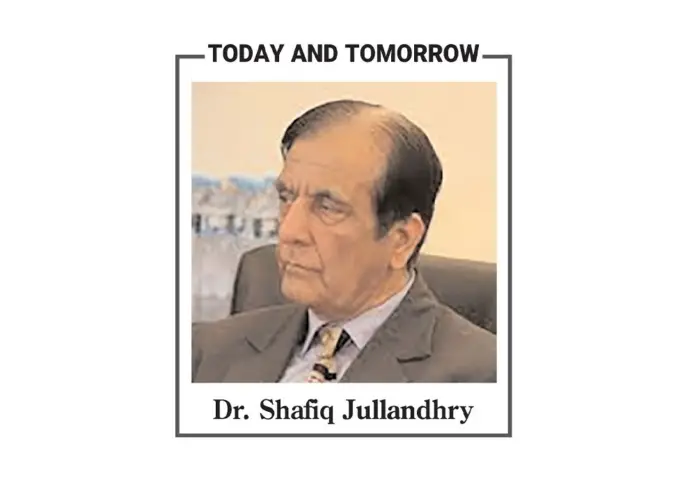Iqbal Hussain Malik is chairman of a Lahore-based pharmaceutical firm that has won the National Award of Exports in its area. Even in his eighties, he has zeal and vigor for serving his country by developing research, better management skills, total quality control, and international standards. With the latest machinery and labs, his unit has a vast facility for meeting the needs of local and international customers for the items they produce.
In a recent meeting with this columnist, he expressed his determination to serve Pakistan with all his energy till his last breath. He said, “It is our great strength that we have become the country’s strength by earning foreign exchange and providing jobs to hundreds of workers and experts.” But he protested that the governments had failed to provide environment-friendly and cheap hydroelectric power to the industry. They are forced to use diesel generators, which are not suitable for the environment and are a costly means of energy production.
Iqbal Hussain Malik appreciated Prime Minister Shehbaz Sharif’s interest in Diamer-Bhasha Dam’s early completion, which will produce around 4800 megawatts of electricity. But, he said that, there are many other opportunities for constructing small hydropower dams that can be completed quickly. He appealed to the government to plan and start new hydroelectric projects to bring the ailing industry out of ventilators.
It is no secret that our enemy is striving hard to keep us away from cheap hydroelectric power and irrigation projects. An example of this is the Kalabagh Dam. Despite the national and international experts’ explicit opinions that the construction of this dam would be a game-changer for Pakistan’s economy, it was made a political issue. Ignoring the construction of the dam is only ‘success’ of anti-Pakistan operators. The international establishment wants to deprive us of all cheap energy sources. Our oil and gas exploration efforts had also been made the target of global conspiracies.
Our political powers are considering making commissions to explore the ‘plot’ behind the ‘ousting’ of Imran Khan’s regime. However, there is a bigger need to understand and probe the reasons for not completing the projects timely instead, which can be the backbone of our economy. The natural causes of this are the corruption of our politicians and policymakers and ‘conspiracies’ of the international establishment. Now, the decisions of these powers about Pakistan are open. “No exit from Pakistan: America’s tortured relationship with Islamabad,” the only one book by Daniel Seth Markey is enough to understand what they want to do with us. It is clear who had been their stooges for this game. They are not outsiders but our policymakers and politicians, bureaucrats, scholars, and experts. It is about time to do much on the right side and tell the nation that we are out of their influence and are not confusing the country and wasting precious time not proceeding ahead.
I was dean of the Faculty of Social Sciences at the Karakoram International University in Gilgit from 2009 to 2012. One of my colleagues was also working with one of the Chinese firms as a consultant. He told me that his Chinese firm had submitted a proposal to the Gilgit-Baltistan government to construct one hundred hydropower stations on the river banks. Every power station will produce around 10 megawatts of power. These total 1000 megawatts of power will be enough for the present needs of the region and for establishing small and medium-size industries everywhere in the area. All conditions were totally in favor of Pakistan. The same Chinese company submitted another plan for the development of gemstone mining. During those days, our university (KIU) had arranged a conference on gemstone mining with the participation of all stakeholders. It was made clear by all stakeholders that our gemstone miners were using outdated methods for mining.
The local miners were wasting at least 80 percent of gemstones during the blasting process and were getting only twenty percent of the yield. Even this twenty percent of the saved gemstones were of low quality. Much of the quality loss was seen during the blasting process. The Chinese company had offered that with expensive laser cutters and high-quality expertise, they could get hundred percent yield of gemstones from the mines without any quality loss. They would give half of it to the federal government and get fifty percent themselves.
It was a perfect proposal, and they had passed on an offer to establish industry and gemstone cutting and polishing factories near the power stations. It was guessed that it would provide jobs to all the willing local people, but thousands of people from other areas would also get jobs in these factories. These great offers from the Chinese company were shared with the federal government for approval but were shelved somewhere in the ministry.
Its fate was like other hundreds of such opportunities destroyed by the ‘stooges’ sitting in the decision-making seats. Recently, we have seen on social media that some experts were shouting about the energy potential of Gilgit-Baltistan, claiming that at least one hundred thousand megawatts of hydropower could be produced in the region. In contrast, Pakistan’s total need for power is 40 thousand megawatts. In this position, what we can expect from our rulers is not inquiries into the conspiracies.
At least, one thing is clear now that the real struggle is between the ‘stooges’ of our enemies and those the government high ups who want national development in the real sense. Go and produce hydropower from the rivers, go and start working on the much-needed Kalabagh Dam, the game-changer of our economy or be ready to get the title of ‘stooges’ of foreign powers.






